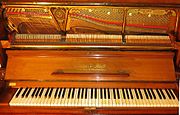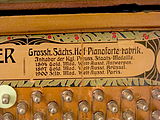Piano factory C. Rich. Knight
The C. Rich. Ritter Halle a / S Pianoforte Fabrik (from 1902 Ritter Halle a / S Pianoforte Fabrik GmbH) was a German company in Halle (Saale) , which manufactured pianos and grand pianos from 1828 until its demise in the Second World War, and these in German-speaking countries and many other countries.
Company history
Beginnings
After a few years, he was able to enlarge the piano manufacturing workshop opened by Carl Friedrich Ritter in Merseburg in March 1828 due to the high demand and moved to Ritterstrasse in Merseburg. Carl Richard Ritter took over the company after the death of his father in 1863. The business also grew thanks to the commitment of his wife Agnes, nee. Garlic, so that a factory could be built on the Merseburg property.
Further growth prompted the Ritter couple in 1882 to look again for more space and qualified workers. They gave up the Merseburg location - at that time a small civil service town - and moved to the neighboring, up-and-coming town of Halle an der Saale to the north, at Leipziger Straße 73. With the intensified mechanization around 1900, the company continued to expand and had to reopen in 1889 looking for new premises. These were found at Königsstrasse 6 in Halle.
Heyday
In 1894 the eldest son Alfred Ritter joined the company, followed by his brother Willi in 1900 and around 1899 by brother-in-law H. Otto Naumann, married to Helene Ritter, who took over the sales management. With this increase in personnel, the company began to carry its products into the world: It visited the world exhibition , the forerunner of today's Expo, in Antwerp in 1894, in Brussels in 1897 , in Paris in 1900 , in Brussels in 1910 and in Turin in 1911 . Not only were high awards received for their pianos, but new business relationships were also successfully established. In Germany itself, the Pianoforte Factory was awarded the Royal Prussian State Medal, as well as the title of purveyor to the court of the Grand Duke of Saxony in Weimar and the King of Romania .
In 1902, CR Ritter withdrew from the company by founding the GmbH and handed over management to his sons Alfred and Willi Ritter and his son-in-law H. Otto Naumann. On February 16, 1910, the company acquired an area of 15,793 m² just outside Halle in order to build a factory with its own siding. In April 1911, parallel work started here. During the First World War , many workers were withdrawn from the factory and they were forced to switch to war production.
Weimar Republic
High import tariffs made it impossible to revive old business relationships abroad. On March 17, 1928, the Ritter GmbH Pianoforte Factory in Leipziger Strasse celebrated its 100th anniversary as the first industrial company in the still young industrial city of Halle. In addition to the company owners, relatives and employees, representatives of various corporations and associations, business friends, also from the Leipzig musical instrument industry and people close to the Ritter family took part. Representatives of the magistrate, the city council, the church, the Chamber of Industry and Commerce, the bank, the lodge, the Mitteldeutscher Rundfunk , the Halle men's choir "Liedertafel", the shooting association and other associations as well as Karl Mannborg, the director of the Theodor Mannborg harmonium factory .
As a result of the Great Depression, the Ritter company went bankrupt in 1929.
Inventions
Baby grand piano with double bass
Around 1920 the Rittersche Pianofabrik invented a baby grand piano , 155 cm long, with a second soundboard for the bass strings. This second mechanism was accessed by pressing a third pedal. This renewal improved the timbre of the bass notes. Mechanikfabrik J. Keller & Co GmbH from Stuttgart contributed to the realization of this technology. Presented at the Leipzig autumn fair in 1920.
Honors
For the company's centenary
The representatives of the Mitteldeutscher Rundfunk stated that the Pianoforte Fabrik Ritter GmbH was given a serenade through radio broadcasting in recognition of their service in the development of broadcasting in Halle and Central Germany. The festival was opened with a radio broadcast of the Freischütz Overture and the D major Symphony by Haydn. The highlight was Schubert's “Ommacht”, performed by the gentlemen of the Liedertafel and a soloist on a knight's grand piano and a Mannborg harmonium. The workforce was given a notable gift of money on the anniversary.
Awards for Ritter pianos
- 1894: Gold Medal, Antwerp
- 1897: Gold Medal, Brussels
- 1900: Silver medal, Paris
- 1910: Diplome d'honneur, Brussels
- 1911: Grand Prix, Turin
Further awards
- Royal Prussian State Medal
- Purveyor title to the Grand Duchy of Saxony-Weimar-Eisenach
- Purveyor to the Court of the King of Romania
literature
- For the 100th anniversary of C. Rich. Ritter, Pianofortefabrik in Halle ad S. In: Zeitschrift für Instrumentenbau. Volume 48, Leipzig 1927-1928, pp. 631-633.
- For the 80th birthday of the piano manufacturer Carl Richard Ritter. In: Zeitschrift für Instrumentenbau. Volume 36, Leipzig 1915-1916, pp. 135-136.
- Ritter baby grand piano with double bass. In: Zeitschrift für Instrumentenbau. Vol. 41, Leipzig 1920–1921, pp. 1380–1381.
- Holger Zürch : "Every Ritter piano must be a masterpiece" - The Ritter piano company , still known to many Halle residents today, built world-renowned instruments. Mitteldeutsche Zeitung Halle, March 18, 1992, page 30
- Holger Zürch: Pianos have long since fallen silent - computers will soon be humming here. The former piano factory becomes an office building with 88 workplaces and 157 training positions. Mitteldeutsche Zeitung Halle, March 17, 1992, page 19
Web links
Individual evidence
- ↑ On the 100th anniversary of the C. Rich company. Ritter ... In: Zeitschrift für Instrumentenbau. Volume 48, Leipzig 1927-28, pp. 631-633, here p. 631.
- ↑ On the 100th anniversary of the C. Rich company. Ritter ... In: Zeitschrift für Instrumentenbau. Volume 48, Leipzig 1927-28, pp. 631-633, here p. 632.
- ↑ On the 100th anniversary of the C. Rich company. Ritter ... In: Zeitschrift für Instrumentenbau. Volume 48, Leipzig 1927-28, pp. 631-633, here p. 633.







